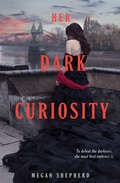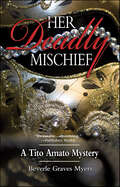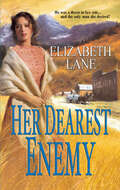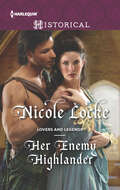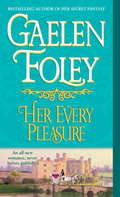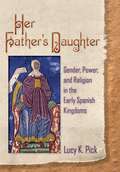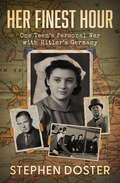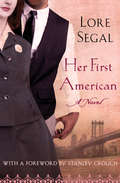- Table View
- List View
Her Christmas Redemption: An Uplifting Inspirational Romance
by Toni ShilohCan she find a second chance… on a town&’s holiday wish list? Organizing her church&’s Christmas Wishes program is the perfect start to Vivian Dupre&’s new life—one without the shame of her recent mistakes. But as she grows closer to co-coordinator Michael Wood, she&’s even more determined to keep her past hidden. Together they can give joy to their small town. But when Michael discovers her secret, will he be willing to grant Vivian&’s holiday wish—forgiveness?From Love Inspired: Uplifting stories of faith, forgiveness and hope.
Her Cinderella Season
by Deb MarloweIn this Regency romance by a USA Today bestseller, a beauty charms everyone at the ball—except an aloof aristocrat, the man she wants the most.She’s been taught that pleasure is sinful . . . Now Miss Lily Beecham is determined to find out for herself!A chance meeting with a viscountess, and Lily is invited to the ball. Freed from dowdy gowns and worthy reading, Lily charms Society. Except for the cold, aloof—and wildly handsome—Mr. Jack Alden.Lily soon learns that Jack’s cold demeanor is belied by the warmth of his kiss. But at the end of the Season, she must return to bleak normality. Unless wicked Mr. Alden can save her from a future of good behavior. . . .Praise for Her Cinderella Season“A lively, entertaining Regency tale about two people who despite their initial meeting, change either’s lives. . . . Secondary characters almost fade into the background as Jack and Lily grow closer. There’s ample romance and plenty of adventure and surprises. Don’t miss this well written, enjoyable book!” —Romance Reviews Today“Deb Marlowe is a good storyteller and her characters always leave me happy to have spent time with them . . . a sweet taste of Regency love.” —Rakehell“Marlowe writes a sensual, emotional and poignant love story.” —RT Book Reviews
Her Clockwork Heart
by Dena GarsonNathaniel Dennison is an investigator with the Royal Intelligence Office. Because of his knack for solving puzzles, he’s assigned a case involving a string of missing scientists. During his investigation he crosses paths with Trixie, the only woman to ever tempt him into considering marriage. Despite the bruising his heart took when she left, he can’t leave her to search for her missing brother on her own.Beatrix “Trixie” Wadeworth is desperate to find her brother. So desperate that she breaks into the Royal Intelligence Office in London. Getting caught is inconvenient. But getting caught by the one man she never stopped loving may actually be fortuitous. It feels like a lifetime since she last saw Nathaniel but it only takes seconds for those feelings to come rushing back. Danger follows Nathaniel and Trixie from London to Edinburgh and back as they search for clues. In the end they find there is more than one mystery to solve. How they ever lived without each other may be the greatest of them all.
Her Cold War: Women in the U.S. Military, 1945–1980
by Tanya L. RothWhile Rosie the Riveter had fewer paid employment options after being told to cede her job to returning World War II veterans, her sisters and daughters found new work opportunities in national defense. The 1948 Women's Armed Services Integration Act created permanent military positions for women with the promise of equal pay. Her Cold War follows the experiences of women in the military from the passage of the Act to the early 1980s. In the late 1940s, defense officials structured women's military roles on the basis of perceived gender differences. Classified as noncombatants, servicewomen filled roles that they might hold in civilian life, such as secretarial or medical support positions. Defense officials also prohibited pregnant women and mothers from remaining in the military and encouraged many women to leave upon marriage. Before civilian feminists took up similar issues in the 1970s, many servicewomen called for a broader definition of equality free of gender-based service restrictions. Tanya L. Roth shows us that the battles these servicewomen fought for equality paved the way for women in combat, a prerequisite for promotion to many leadership positions, and opened opportunities for other servicepeople, including those with disabilities, LGBT and gender nonconforming people, noncitizens, and more.
Her Colorado Man
by Cheryl St. JohnWhen eighteen-year-old Mariah found herself pregnant and unmarried in her small Colorado town, she disappeared. One year later, she returned with a baby--though minus the "husband" who had conveniently ventured off to Alaska's gold fields to seek his fortune....But now, with handsome adventurer Wes Burrows turning up and claiming to be the husband she had invented, Mariah's lies become flesh and blood--and her wildest dreams a reality!
Her Convenient Cowboy
by Lacy WilliamsDo You Take This Cowboy? A blizzard traps rancher Davy White in his family's secluded cabin with Rose Evans...and she's nine months pregnant! Help is miles away, and Davy must work to keep them both alive. As the storm rages outside, he comes to care for the vulnerable widow. Enough that he's willing to offer her his name-against his family's objections. Rose will do anything for her baby, but she's recently widowed. She doesn't know if she can trust the feelings she has toward Davy. And she refuses to come between him and his family. But the more time they spend together, the less she can resist the comforting, caring cowboy. Wyoming Legacy: United by family, destined for love
Her Convenient Husband's Return (Mills And Boon Historical Ser.)
by Eleanor WebsterA marriage in name only leads to unexpected passion in a Regency romance that shows what happens when the heart clashes with the head.Her husband is back—and everything has changed . . .After Beth Webster married her childhood friend to escape from debt, he swiftly returned to his life in London. But now Rendell Graham is back as lord of the estate, and Beth’s heart pounds whenever he is near! She’s wary of expectations to produce an heir, for fear of passing on her blindness. But Ren’s hidden sensitivity is a surprise—could their arrangement become something much more passionate?“[A] very engaging historical story . . . original and highly entertaining.” —alwaysreviewing.com
Her Cowboy Deputy
by Lacy WilliamsStranded! Bear Creek sheriff's deputy Matt White is used to being the rescuer, not the rescued. But now the hurt lawman's marooned on Catherine Poole's remote homestead. The little girl he'd known briefly as a child is all grown up-and tugging at his heart. Isolated from the world around her, Catherine's spent her whole life caring for her ailing grandfather. The last thing she needs is a cowboy stranded in her home. Let alone the memories he dredges up of a past she's tried to put behind her. But can this deputy be her chance to finally move forward and find true happiness?
Her Cowboy Protector
by Cathy Gillen Thacker Pamela BrittonFind your Happily Ever After with two feel-good stories of dogs unleashing romance in small-town settings.RESISTING HER RESCUERThe Ranger’s Rodeo Rebel by Pamela BrittonUnder the guise of taking over the family’s rodeo act, former army ranger Chance Reynolds is actually home to protect their star trick rider, Carolina Cruthers, from her ex. Keeping an eye on the fearless blonde isn’t tough. Keeping things professional? That’s tougher. As life on the rodeo trail draws them closer, what started as a short-term arrangement is becoming something more. Can Chance convince Caro that they should team up forever?The Texas Lawman’s Woman by Cathy Gillen ThackerThanks to her scheming ex-husband, Shelley Meyerson is about to lose her home. The last person she wants to turn to is deputy sheriff Colt McCabe, the guy who broke her heart in high school. True, the handsome lawman seems to genuinely care about Shelley and her little boy. But learning to trust again is hard. Especially when Colt’s been keeping a secret that could cost him his badge…
Her Cowboy Soldier
by Cindi MyersCan she open her heart?The Hartland Herald isn’t exactly the big leagues. But for army widow Amy Marshall it’s the first step to a career that will allow her to support her young daughter and start a new life in the city. Unfortunately, writing a story that will get her noticed requires stepping on a few toes. Josh Scofield’s toes, to be exact.Sure, her article was less than flattering. She probably shouldn’t have suggested the injured veteran got his teaching position unfairly, but a real reporter can’t pull punches. And she hadn’t pegged the former military man as someone who cared what other people thought.As she digs deeper, though, Amy realizes there’s more to Josh than just a good story. But it will be hard to win his trust, and is there any point when she doesn’t plan on sticking around?
Her Dark Curiosity
by Megan ShepherdInspired by The Strange Case of Dr. Jekyll and Mr. Hyde, this tantalizing sequel to Megan Shepherd's gothic suspense novel, The Madman's Daughter, explores the hidden natures of those we love and how far we'll go to save them from themselves.Back in London after her trip to Dr. Moreau's horrific island, Juliet is rebuilding the life she once knew and trying to forget her father's legacy. But soon it's clear that someone--or something--hasn't forgotten her, as people close to Juliet start falling victim to a murderer who leaves a macabre calling card of three clawlike slashes. Has one of her father's creations also escaped the island? As Juliet strives to stop a killer while searching for a serum to cure her own worsening illness, she finds herself once more in a world of scandal and danger. Her heart torn in two, past bubbling to the surface, life threatened by an obsessive killer--Juliet will be lucky to escape alive.
Her Dark and Dangerous Lord
by Anne HerriesLord Stefan de Montfort is a true rebel-with the scars to prove it. Deemed a mercenary and exiled from England, he now lives by his own rules.When he plucks Englishwoman Anne Melford from the sea and takes her to his chateau in Normandy, the innocent yet spirited beauty awakens in Stefan a disturbing, forbidden desire. A lady such as Anne could never marry a scoundrel like him-but this dark and dangerous lord is determined to break one last rule and claim her as his bride!
Her Deadly Mischief: A Tito Amato Mystery (large Print 16pt) (Tito Amato Series #0)
by Beverle Graves MyersVenice, 1742. Tito Amato has regained his zest for performing and is once again singing lead roles at the Teatro San Marco. On opening night, the famous castrato has the entire audience entranced—except for one box with its scarlet curtains stubbornly drawn. Annoyed at being ignored, Tito aims the full force of his golden throat at the fourth-tier box. He is astounded when the curtains part and a woman tumbles over the railing.The victim is Zulietta Giardino, a mischievous courtesan involved with a young glass maker. Did a wager over a rival courtesan's jewels spell Zulietta's death? Or did the motive involve sinister events in the glass factories of Murano?Tito faces troubles of a different sort at home. His upstanding neighbors regard his household as an immoral den of theatrical riffraff and disdain his wife, Liya, as an apostate Jew. While Liya attempts to reconcile with her disapproving family in the ghetto, Tito strives to be a good father to his adopted son.
Her Dearest Enemy
by Elizabeth LaneA Colorado banker spars with a local schoolteacher in a rivalry that leads to love in this Western historical romance.Colorado, 1884. Widower Brandon Calhoun is the most powerful man in Dutchman’s Creek, but he’s far from the happiest. Raising his daughter alone is hard enough without an amorous young man making secret advances. And it doesn’t help that the boy’s older sister and guardian is the town’s disarmingly attractive schoolteacher.Harriet Smith has been teaching in Dutchman’s Creek for less than a year, but she already knows Brandon’s no-nonsense reputation. The ruggedly handsome banker wants more for his daughter than this frontier town has to offer. But he’s about to learn that love is closer to home than he ever imagined . . .
Her Elemental Viking: Cinque Storie d'Amore Paranormali
by Alice Arcoleo Aj TiptonAntichi vichinghi, magia, e donne intraprendenti travolti da una sconvolgente passione. Più di un milione di anni fa, una strega maledisse quattro affascinanti fratelli vichinghi. Oggi sono ancora sexy e immortali, ma condannati a soffrire per l'eternità a causa dei loro errori... oppure no? Il suo Focoso Vichingo è una piccante novella dalle sfumature soprannaturali. Se vi piacciono le ardenti storie d’amore da leggere tutte d’un fiato, allora amerete questa novella indipendente che fa parte della saga Her Elemental Viking. Il suo Bollente Vichingo è il racconto del sexy Bram adatto a dei lettori maturi. Contiene una spettrale nonna esperta nel combinare incontri, parecchio divertimento in una vasca, e una strega il cui tocco potrebbe essere abbastanza magico da cambiare ogni cosa. Il suo Alato Vichingo racconta della fuga di Erik che incontrerà arrapati immortali, una barista che adora interpretare il ruolo di Cupido, e un amore così potente da farti toccare il cielo. Il suo Vichingo Duro come la Roccia narra le vicende di Carr e un'isola magica che vedrà parecchio romanticismo, scene sexy in una cascata e un amore così passionale da far tremare la terra. Un vichingo per Natale contiene regali peccaminosi, incantesimi e una vacanza invernale piena di meraviglie. Queste novelle indipendenti fanno parte della saga Her Elemental Viking. e possono essere lette in qualsiasi ordine. Non ci sono finali in sospeso e finiscono per come dovrebbero: e vissero tutti felici e contenti.
Her Enemy Highlander: The Countess And The Cowboy The Rebel Daughter Her Enemy Highlander Winter's Camp (Lovers and Legends #0)
by Nicole LockeA young woman out for revenge finds herself in the clutches of a rugged and sexy rival in this suspenseful Medieval Scottish romance.Scotland, 1296. Impulsive Mairead Buchanan’s only goal is to track down the man responsible for her brother’s death. Until a shameful encounter with Caird of enemy clan Colquhoun proves a distraction she can’t ignore . . .When the secrets of a jeweled dagger are revealed and Mairead is kidnapped by this sexy highlander, she finds herself on a twisting path of passion and peril! With Mairead’s recklessness a perfect foil to Caird’s cool command, can these two enemies set their clans’ differences aside and surrender to the desire that rages between them?
Her Enemy at the Altar: Sheikh's Mail-order Bride Miss Marianne's Disgrace Her Enemy At The Altar
by Virginia HeathA marriage of convenience unites an awkward young woman with her handsome bully . . . and just might end a family feud in this Regency romance.Scandal broke last night when Lady Constance Stuart was discovered in the arms of Aaron Wincanton, the son of her family’s greatest enemy! But now we can reveal an even more shocking development. Our sources say a special license was obtained and the two were married before sunrise!It’s been confirmed that Aaron has stolen his new bride away to the country to begin their unexpected marriage. We’ll be watching closely to see exactly what happens when a gentleman invites his enemy into his bed . . .
Her Every Pleasure
by Gaelen FoleyFrom the glittering ballrooms of Regency England to the sapphire waters of the Mediterranean, the dazzling finale of Gaelen Foley’s Spice trilogy unfurls the passionate tale of a rebel princess and the powerful warrior destined to become her champion. Princess Sophia was only a child when Napoleon conquered the island paradise ruled by her father. Raised in England and now twenty-one, she means to claim the throne that is rightfully hers and bring peace to her war-torn land. But an ambush by enemies forces Sophia into hiding outside London. Disguising herself as a peasant girl until she can safely return, she meets Major Gabriel Knight, a wounded warrior whose brush with death has utterly changed him. Heir to a great fortune, and a master swordsman, Gabriel has given up his worldly possessions and laid down his arms. Sophia is fascinated by his brooding magnetism, and Gabriel, lured by her fiery beauty and healed by her touch, is drawn back inexorably toward the world of the living. But when Sophia’s royal destiny is revealed, Gabriel knows he must take up his sword again, whatever the cost, to protect his princess from those who would destroy her. And as longing blossoms into passion, Gabriel discovers the one cause that is truly worth fighting for. . . . From the Paperback edition.
Her Father's Sins: An extraordinary saga of hope against the odds (Queenie's Story, Book 1)
by Josephine CoxDoes Queenie have the strength to overcome her father's sins and grasp love and happiness? Josephine Cox brings us the first instalment of Queenie's story in Her Father's Sins, the unforgettable saga of a young woman's refusal to settle for second best. Perfect for fans of Dilly Court and Sheila Newberry. Queenie seemed born to suffer. Her mam died giving birth to her, her drunken father George Kenney ignored her unless he was cursing her, and only beloved Auntie Biddy provided an anchor for the little girl. Growing up in post-war Blackburn, life could be tough when Biddy had to take in washing to make ends meet - at a time when the washing machine began to gain popularity. After Auntie Biddy's death there was only Queenie to care for the home and to earn money, and no one to protect her from the father who blamed his daughter for her mother's death.But Queenie is resilient. And in spite of hardship, she grows up tall and strikingly beautiful with her deep grey eyes and her abundant honey-coloured hair. Love, in the shape of Rick Marsden, might have released her from the burden of the drink-sodden George. But the sins of the fathers cannot be easily forgotten... What readers are saying about Her Father's Sins: 'A well written book and one that I found I couldn't put down until I had read it from cover to cover in one go!''This is an excellent story with the various strands all marvellously coming together at the end''I loved every word of the book - five stars'
Her Father's Sins: An extraordinary saga of hope against the odds (Queenie's Story, Book 1)
by Josephine CoxDoes Queenie have the strength to overcome her father's sins and grasp love and happiness? Josephine Cox brings us the first instalment of Queenie's story in Her Father's Sins, the unforgettable saga of a young woman's refusal to settle for second best. Perfect for fans of Dilly Court and Sheila Newberry. Queenie seemed born to suffer. Her mam died giving birth to her, her drunken father George Kenney ignored her unless he was cursing her, and only beloved Auntie Biddy provided an anchor for the little girl. Growing up in post-war Blackburn, life could be tough when Biddy had to take in washing to make ends meet - at a time when the washing machine began to gain popularity. After Auntie Biddy's death there was only Queenie to care for the home and to earn money, and no one to protect her from the father who blamed his daughter for her mother's death.But Queenie is resilient. And in spite of hardship, she grows up tall and strikingly beautiful with her deep grey eyes and her abundant honey-coloured hair. Love, in the shape of Rick Marsden, might have released her from the burden of the drink-sodden George. But the sins of the fathers cannot be easily forgotten... What readers are saying about Her Father's Sins: 'A well written book and one that I found I couldn't put down until I had read it from cover to cover in one go!''This is an excellent story with the various strands all marvellously coming together at the end''I loved every word of the book - five stars'
Her Father’s Daughter: Gender, Power, and Religion in the Early Spanish Kingdoms
by Lucy K. PickIn Her Father's Daughter, Lucy K. Pick considers a group of royal women in the early medieval kingdoms of the Asturias and of León-Castilla; their lives say a great deal about structures of power and the roles of gender and religion within the early Iberian kingdoms. Pick examines these women, all daughters of kings, as members of networks of power that work variously in parallel, in concert, and in resistance to some forms of male power, and contends that only by mapping these networks do we gain a full understanding of the nature of monarchical power. Pick's focus on the roles, possibilities, and limitations faced by these royal women forces us to reevaluate medieval gender norms and their relationship to power and to rethink the power structures of the era. Well illustrated with images of significant objects, Her Father's Daughter is marked by Pick's wide-ranging interdisciplinary approach, which encompasses liturgy, art, manuscripts, architecture, documentary texts, historical narratives, saints' lives, theological treatises, and epigraphy.
Her Finest Hour: One Teen's Personal War with Hitler's Germany
by Stephen DosterIn this WWII memoir, a woman recounts her struggle to survive and serve her country in the Women&’s Auxiliary Air Force. Marjorie Terry Smith was a teenage girl living in the suburbs of London when the Second World War began. Before it was over, her family would be bombed out of three homes, her fiancé would be killed fighting Rommel&’s forces in North Africa, and she would join the WAAF. Stationed in the operations rooms on seven different Royal Air Force bases, she encountered RAF legends Douglas Bader and Leonard Cheshire, as well as the indomitable Winston Churchill. In Her Finest Hour, Smith recounts a youth in England leading up to the war, her six years of service, and life in a recovering England, in which she worked for the British Overseas Airways Corporation as well as the BBC. Vividly recalling how the war changed her life and the world around her, Smith offers a rare insider&’s view of WWII military operations from a woman&’s perspective, as told to her son, Stephen Doster.
Her First American: A Novel
by Lore SegalHailed by the New York Times as coming &“closer than anyone to writing The Great American Novel,&” Lore Segal stuns with this passionate love story of a refugee from Hitler&’s Europe and a witty, hard-drinking black intellectual For Ilka Weissnix, everything is new. Having recently arrived in the United States, she is determined to escape the immigrant communities of New York and boards a train headed west to discover &“the real America.&” She finds Carter Bayoux &“sitting on a stool in a bar in the desert, across from the railroad.&”Older, portly, experienced, and black, Carter is magnetic. To Ilka, he exemplifies the values and cultures of a changing America. In order to understand her new country and her new love, Ilka throws herself into Carter&’s dizzying world, nurses him through his bouts of depression and his alcoholism, and becomes fascinated by stories of his amorous past. But Carter&’s ghosts are ever present, and soon Ilka finds herself torn between saving him and saving her own future.With a foreword by Stanley Crouch, Her First American is the poignant story of an immigrant experience in a country of endless possibilities and of a rich and breathtaking love that is doomed from the start.
Her First Desire: A Logical Man's Guide to Dangerous Women Novel (Logical Man's Guide to Dangerous Women)
by Cathy MaxwellIf you love Lenora Bell and Tessa Dare, you’ll love the next book in New York Times bestselling author Cathy Maxwell’s Logical Man’s Society series about a delicious battle of the sexes between a determined woman and a stubborn gentleman. She arrived in town, beautiful and bold and declaring that she’s inherited property that that he has already claimed! As a member of the local Logical Men’s Society, Ned Thurlowe prides himself on thinking clearly and calmly at all times. And it’s clear that the meeting place of the society—a local tavern—is his even if the men have turned it to shambles. But Ned’s claim is challenged Gemma Estep, who’s announced she’s decided to turn it into some sort of respectable tea garden for the local ladies. Ned challenges Gemma, and in doing so behaves most illogically, for though he wants to dismiss her, he also can’t help but desire her. Gemma has had enough of men telling her what to do, and she’s vowed to make her own way in the world. And Ned Thurlowe is ruining her plans. Not only has he laid claim to her property, pitting them in a heated fight for its ownership, he’s also arousing in her feelings she’s never sensed before. And although they argue, they quickly discover they have more in common than they’d each ever dreamed—could their disagreement be turning into desire?
Her Forbidden Amish Love
by Jocelyn McClayFollowing your heart isn’t always simple when you have to choose between your community and the man you still love . . . Five years ago, Hannah Lapp walked away from Gabe Bartel, crushing their dreams of a future together. She couldn’t break her parents’ hearts by marrying a Mennonite man and leaving the Amish community. Now Gabe is back as her town’s new EMT. And Hannah’s heart is on the line all over again, because this time she can’t imagine letting him go . . . From Harlequin Love Inspired: Uplifting stories of faith, forgiveness and hope.










